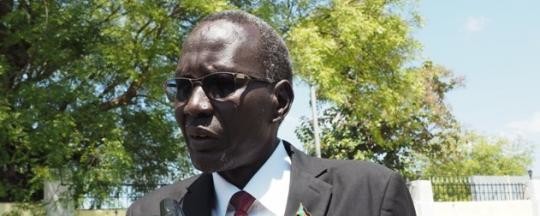South Sudan shifted over $225 million of oil sales to its state-owned oil company over a recent one-year period, even as oil revenues plummeted by a third over the same period, government documents show.
The revelation may buttress reports that funds from the state-owned Nile Petroleum Corporation, known as Nilepet, purchased arms for government-aligned militias, bypassing army procedures. Both the United Nations Panel of Experts on South Sudan and the Small Arms Survey – a Geneva-based research institution that reports heavily on South Sudan – say that the National Security Service approved Nilepet funds to arm Dinka Padang militias around the oil fields.
Militia from the communities around the Upper Nile oil fields have been accused of involvement in the attack on the UNMISS Protection of Civilians camp in Malakal last month that killed as many as 40 displaced South Sudanese.
According to the crude oil marketing reports produced by the South Sudanese Ministry of Petroleum and Mining, and obtained by Radio Tamazuj, the state-owned Nile Petroleum Corporation, known as Nilepet, was allocated an unusual $227 million dollars of oil revenue in the fiscal year June 2014- May 2015.
The $227 million to Nilepet is nine times the $25 million it received in the year prior, according to the reports, making it unlikely to be accounted for in operational costs.
The government diverted its most valuable oil in the period to repay loans and capitalize Nilepet, suggesting priority to those expenditures. “The lower sales value per barrel for RSS sales reflects the allocation of cargoes valued at higher prices to loans and to Nilepet in the latter part of 2014,” reads the marketing report.
The $227 million to Nilepet represents 9% of South Sudan’s total sales revenues for the period of May 2014-5, leaving 41% for South Sudan’s public budget. Unspecified loan repayments comprised another 14% of the government’s oil revenue, as well as 35%, or $836 million, that is owed to Sudan from those sales.
It is unclear from the document if any of that money was paid to Sudan or not. The document notes that South Sudan fell behind on its payments to Sudan and began paying Sudan with “in kind” oil transfers in March 2015, in lieu of cash.
In the 2013-2014 fiscal year, Nilepet sold one cargo-load of crude oil for $25 million, which equalled less than 1% of government sales the previous year. But the next year, Nilepet sales rose to $123 million. In addition, Nilepet received over $100 million in “reallocated” sales.
The “reallocated” sales to Nile Petroleum arrived in two large transfers: $63 million in June, and $42 million in November. The unexplained reallocated sales did not appear as a revenue line in the previous annual report.
Over the same period, gross sale revenues fell by a billion dollars, from $3.3 to $2.3 billion.
Arming militias in Upper Nile
Nilepet funds purchased arms for Dinka Padang militias through the national security apparatus, according to two investigative reports, including one produced by the United Nations.
“The arming of those communities largely circumvented the SPLA weapon supply and accounting mechanisms, with the Dinka Padang militias in particular receiving small arms and ammunition directly through the Internal Security Bureau, headed by Akol Koor, with financial authorization for the purchase and transfer provided through the Nile Petroleum Corporation by a Dinka Padang and Minister of Petroleum and Mining, Stephen Dieu Dau,” read the UN panel of experts report in January, citing “multiple, independent sources with first-hand knowledge.”
Akol Koor sits on the board of Nilepet. He is the only security official on the board. The Internal Security Bureau is a department of the National Security Service.
Small Arms Survey has published similar findings. “By the beginning of 2015, the GRSS found itself increasingly reliant on the Padang Dinka militias to secure territory and oil resources in Upper Nile state. This situation was paralleled in Unity state, where Padang Dinka militias from the Panaru Dinka took control of the Toma and Toor oil fields; these militias were also funded and armed by the Internal Security Bureau via Stephen Dieu Dhau,” Small Arms Survey reported.
The Dinka Padang are not “directly answerable to the SPLA military hierarchy” and have been used in a campaign to take control of the East Bank of the Nile from the Shilluk, which historically also reside there, the Small Arms Survey report added.
Koor first bypassed the SPLA before the war to purchase Israeli rifles, according to the Panel of Experts report, which “were handed out to members of the Mathiang Anyoor [militia] from the presidential palace as they targeted Nuer in Juba in December 2013.”
Koor also directed the Israeli ACE rifles to Dinka Padang militias formed in Upper Nile in 2014, Small Arms Survey said. “Since March 2015, these militias have burnt Shilluk settlements, killed Shilluk civilians, and attacked the Agwelek forces of Johnson Olonyi,” the research institution reported.
According to the UN Panel, South Sudan continued to seek arms after August 2015 peace deal. “As recently as November, the Panel has been in touch with two arms brokers contacted by third parties claiming to act on behalf of the Government and offering to pay for arms with South Sudanese crude,” said the Panel’s January report.
Last June, Radio Tamazuj published internal NilePet documents showing tens of thousands of dollars given away as favors by the Nilepet’s director, Joseph Cleto Deng. President Kiir sacked Cleto in November, citing Cleto’s inexperience in the oil industry. Previously, Cleto served as the office manager for the SPLM chairman.
File photo: South Sudan’s Minister of Petroleum Stephen Dhieu Dau




